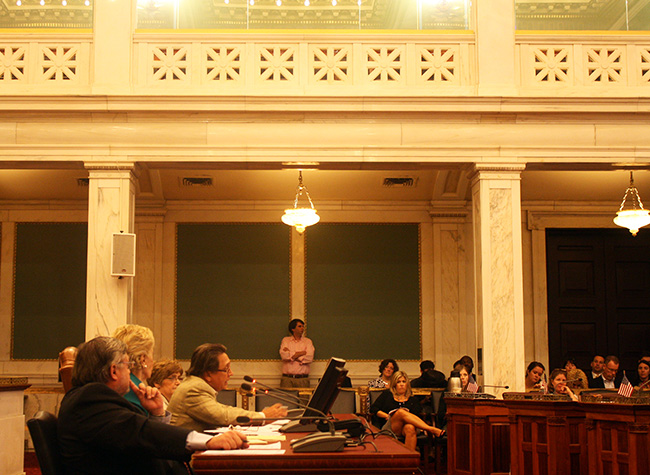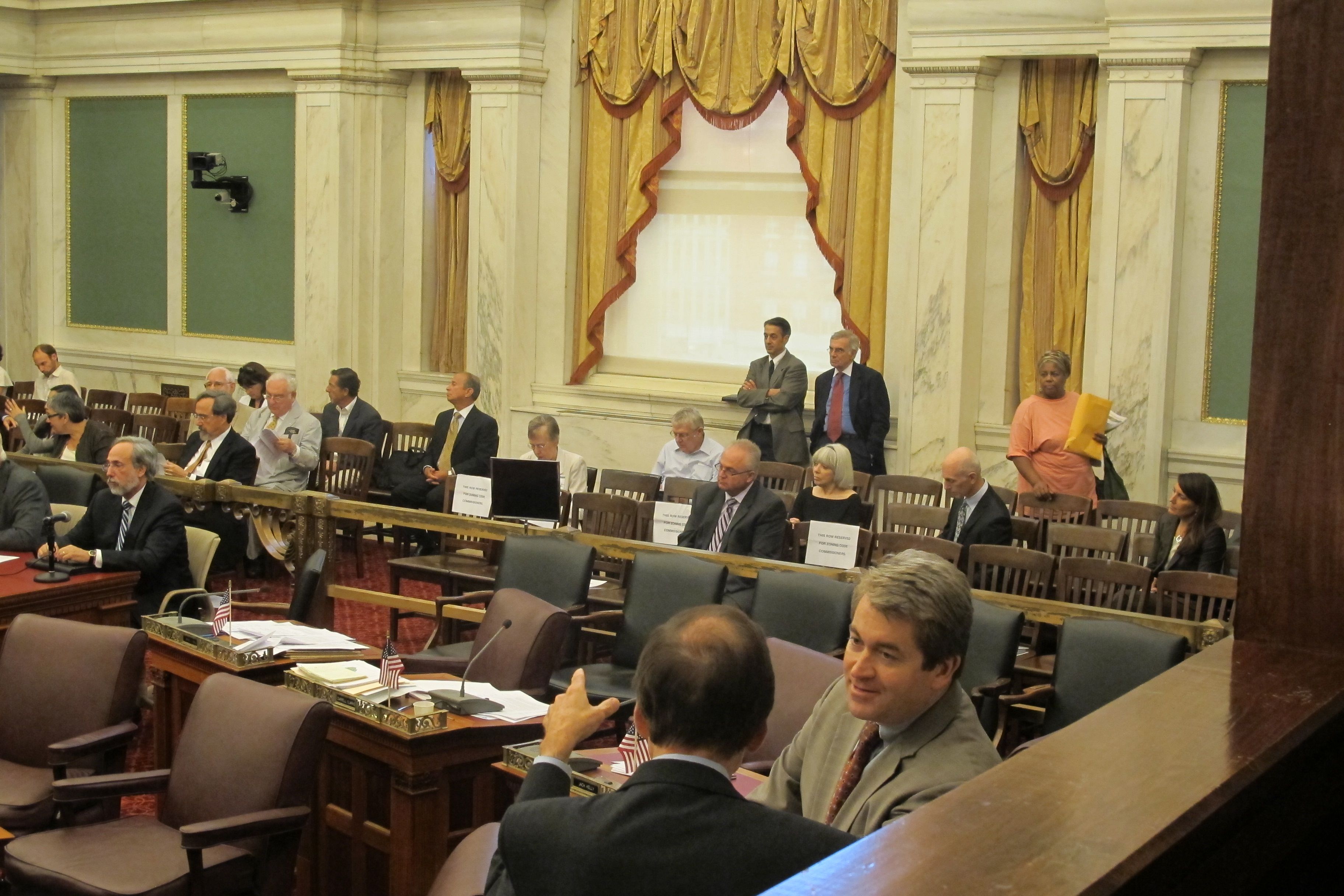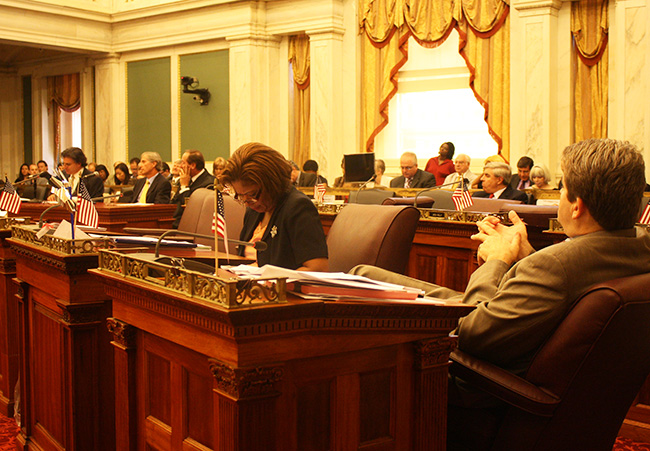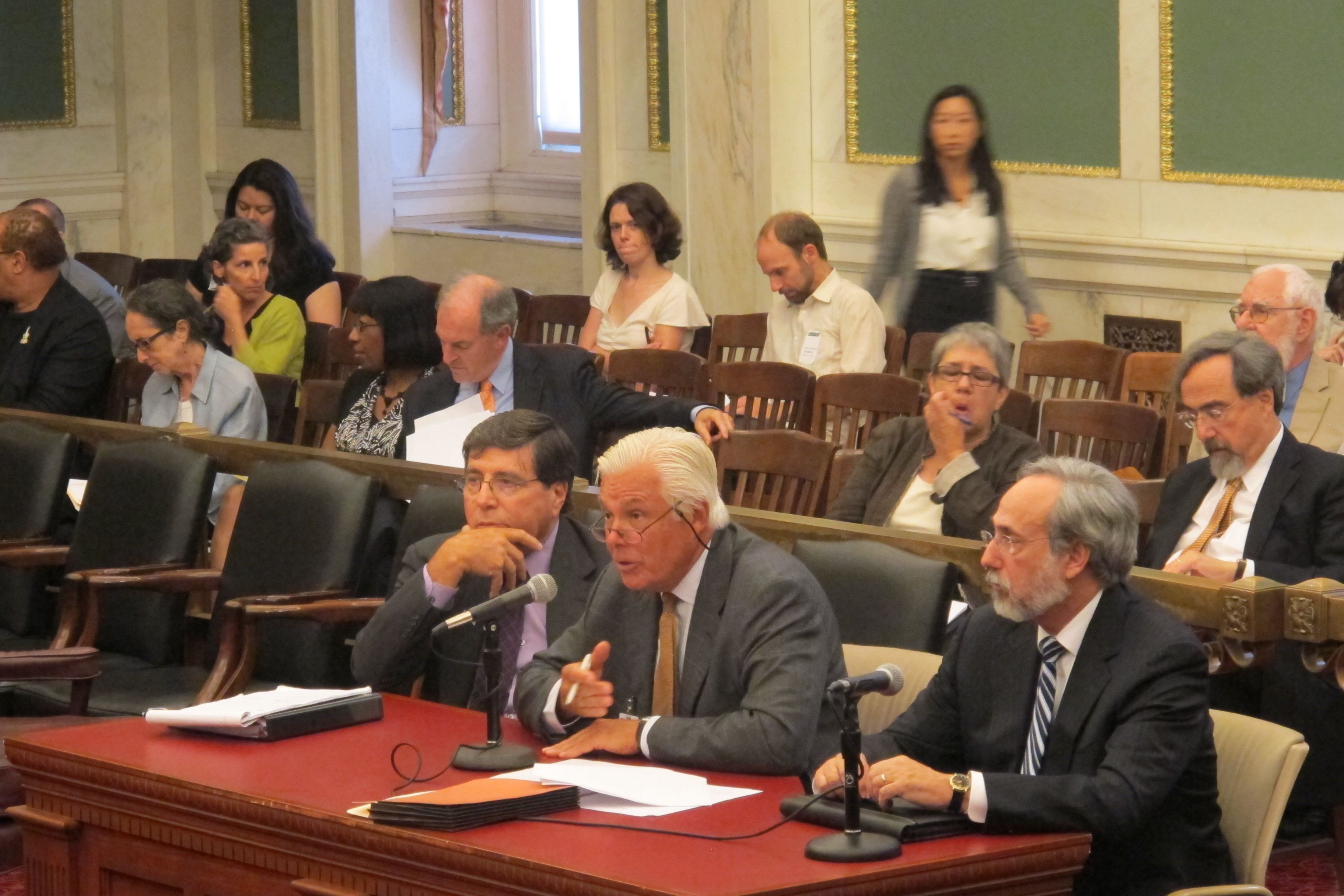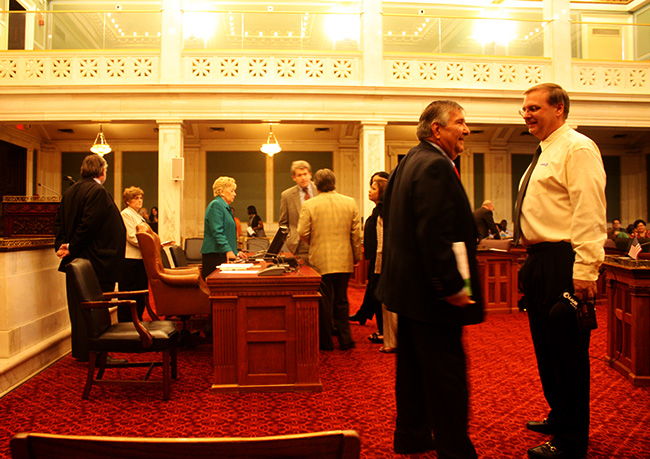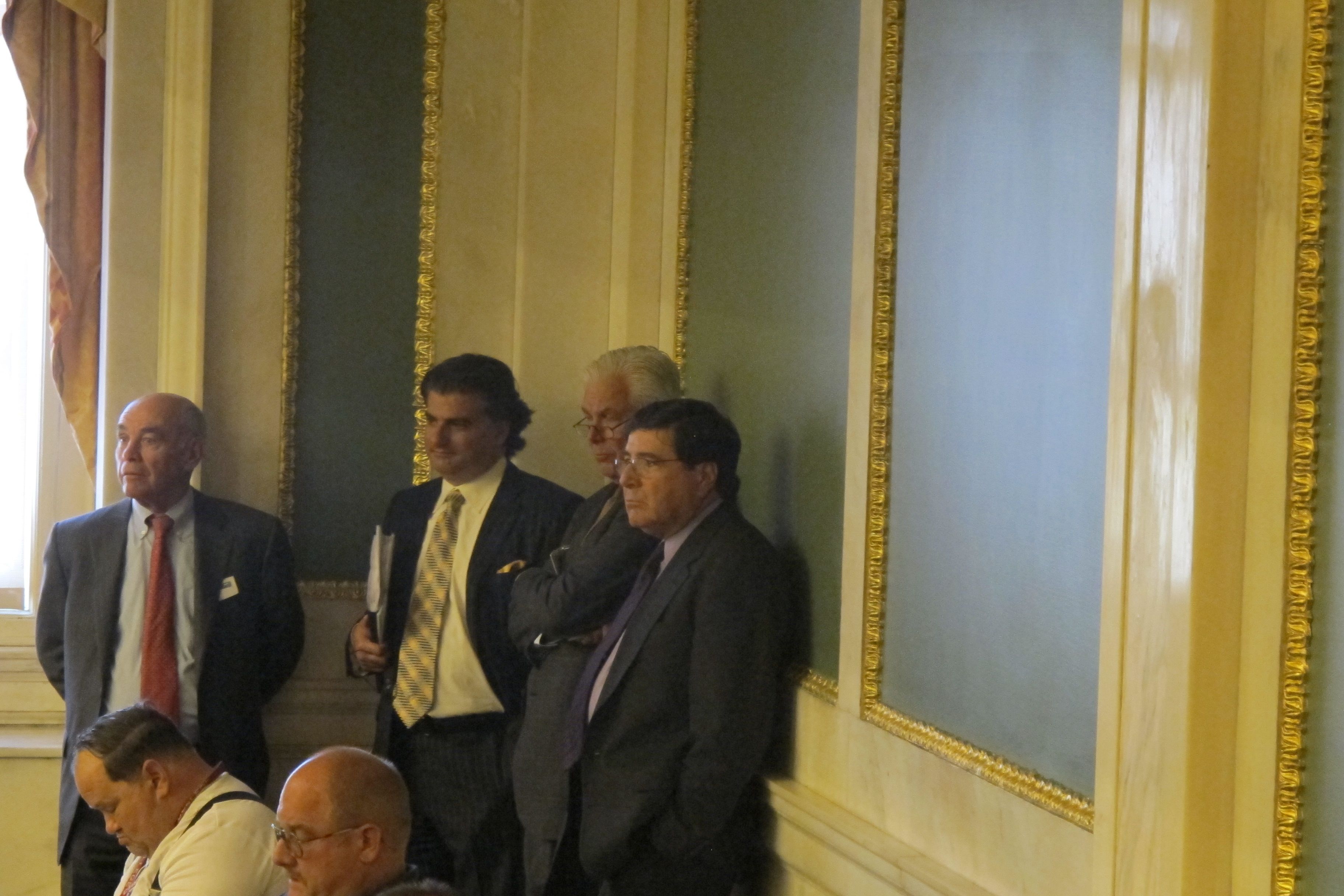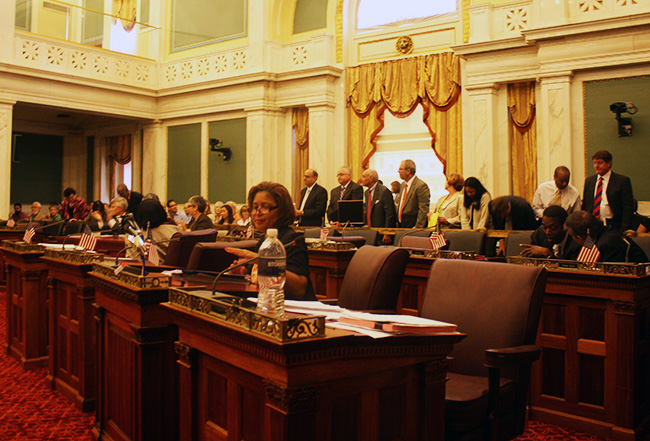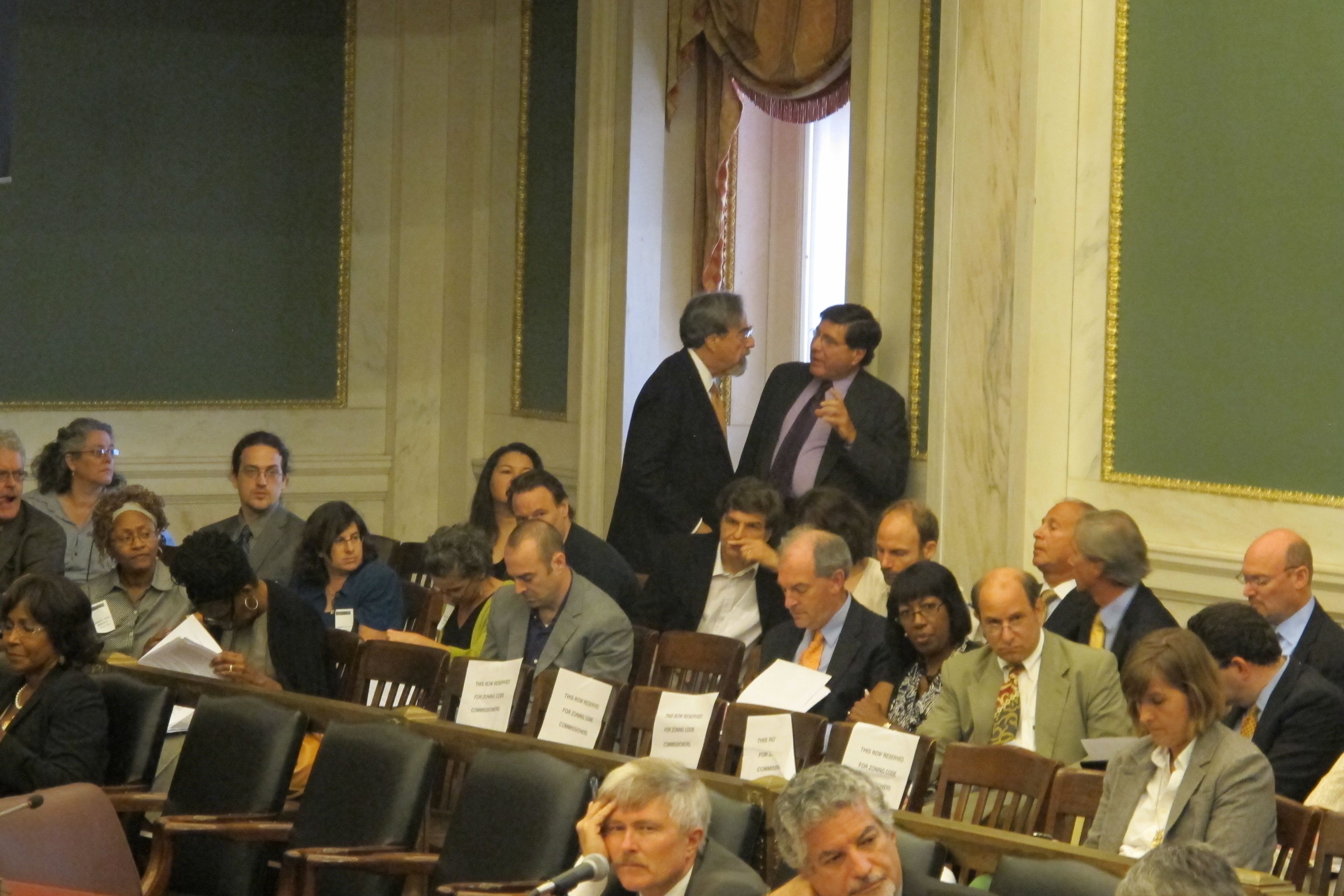Council hears hours of public testimony on ZCC proposals, agrees to take up the issue again in two weeks
Working from a single-item agenda on Wednesday, City Council held a seven-hour session of public testimony on the proposals of the Zoning Code Commission. And if the ZCC has its way, the first public hearing on the draft new zoning code could also be the last.
Eva Gladstein, executive director of the ZCC, announced a timeline yesterday which calls for hearings to be closed by September 26th. That draft timeline also suggests that Council send a resolution and final recommendations back to the ZCC by October 20th, the ZCC send its Final Report to Council by November 17th, Council hold hearings on the new zoning ordinance in early December, and, finally, take action on the ordinance before the end of the year. Though Gladstein stressed that the timeline was merely a draft, it was clear that the ZCC is pushing to get a new code approved in 2011.
More than 40 witnesses signed up to testify in the first public hearing on the ZCC’s proposals since Resolution No. 110459 was passed in June. They were divided into 13 panels, the first of which included ZCC members Gladstein and Alan Greenberger, as well as Don Elliott, a consultant with Clarion Associates. Greenberger opened testimony by introducing members of the ZCC who were present at the hearing, which drew a round of applause from some Council members and others.
Greenberger said his testimony would be focused only on those issues which “engendered questions” from members of Council. Specifically, he said the first panel would be concentrating on “The potential impact of conversion to the new code with regard to treatment of uses,” “The consolidation of three automobile-oriented commercial districts into one new district,” and “The role of citizens in the new code, including how to manage community input in those situations where there is no organized community group.” When the ZCC briefed Council last week, several Council members expressed concern about the latter item.
Eva Gladstein then took the floor and reviewed the provisions of the draft which relate to community input in the development process. “The Zoning Code Commission has been working for over two years to clarify the role of citizens, not just registered community organizations, in the zoning process,” Gladstein said. “We believe that we have come up with a uniquely Philadelphia set of tools to ensure that all residents have an appropriate voice in zoning decisions that will impact their quality of life.”
Gladstein said that draft provisions relating to both Registered Community Organizations and Civic Design Review improve community members’ power to manage development in their neighborhoods. In response to a question from Councilwoman Marian Tasco, Gladstein said that the ZCC plans on formalizing the process for development in areas where there are no RCOs.
Gladstein reminded Council that the ZCC has meetings scheduled for October 12th and November 9th, and said the Commission is willing to schedule extra meetings if necessary in order to meet the proposed timeline.
Don Elliott, who has consulted on zoning issues across the country, discussed how Philadelphia’s zoning reform project has been both similar to and different from other zoning projects in other cities. Among the similarities between zoning reform in Philadelphia and other large cities, Elliott mentioned the ZCC’s decision to separate the updating of the text of the code and the remapping process. He said that combining the two “can shift the focus from policy level discussions about what is best for the city as a whole to micro-level discussions about a specific property or block.”
The panel fielded questions from Council for the next hour-and-a-half. Council members’ questions circled around a handful of issues, including RCOs, Accessory Dwelling Units, student housing, neighborhood overlays, and nightclubs and other potentially harmful uses.
Councilman Darrell Clarke asked the panel how it planned to deal with the possibility of multiple RCOs having influence over the same area. Clarke said that in the 5th Council District, which he represents, there are certain areas where as many as ten community organizations control the same four-block area. “How will you determine who is going to be that RCO recognized by the government?” Clarke asked.
“We decided that we were not in the position to appoint one group or another group,” Gladstein responded. She said there would be situations where RCOs with overlapping boundaries would have to coordinate with each other. Greenberger clarified that the draft encourages RCOs to organize a single meeting with the developer of a given project, to avoid an overly burdensome series of meetings.
Echoing a concern she’d raised at the last ZCC briefing, Councilwoman Marian Tasco asked the panel about Accessory Dwelling Units and the possibility of single-family residential districts converting to multi-family when the new code is enacted. Gladstein assured Tasco that there was no provision in the new code that would allow a single-family district to convert to multi-family by right.
Councilwoman María Quiñones-Sánchez asked the panel whether there was anything in the draft that would limit a Council person from creating an overlay or otherwise amending the code after it’s enacted. The panel assured her there was not. The Councilwoman later asked whether the Commission would be willing to carve out exceptions relating to use controls for individual neighborhoods—something the ZCC has been trying to avoid all along. “We’re open to the conversation,” Alan Greenberger told her. He added, “In general, we’d rather be more restrictive citywide and not have to deal with this bit-by-bit.”
Throughout the testimony of the first panel—and throughout the rest of the hearing—At-Large Councilman Bill Green frequently interjected with questions and clarifications. Many of the Councilman’s statements had to do with a series of recommendations for draft amendments which he issued last week.
For example, Green argued out that even though regulated uses will only be permitted by right in the least restrictive districts—such as heavy industrial, which Green points out comprise around 8 percent of zoned land in the city—there are areas in Philadelphia where these districts are adjacent to residential districts. He said he foresees the possibility of a harmful use going into a residential neighborhood as a result of the automatic conversion to the new code. If that happened, Green said, the City wouldn’t be able to remove the use without paying for it. Gladstein and Greenberger sought to assure Council that regulated uses are subject to their own distancing controls, and would largely be prevented from being too close to residential neighborhoods and an to each other.
“I’m not saying it’s a huge problem, but it’s a problem if it’s your neighborhood,” Green said.
Green also had the panel agree on-record that his and other Council members’ recommendations would not prevent the zoning reform project from serving some of its major purposes. “It seems to me,” Green said, “that we will still achieve our goal of eliminating a lot of cases at the ZBA even if the ZCC majority or the administration were to agree with all of the proposals so far that you have heard from Council […] Even accepting everything that we’ve done, we will have achieved that major goal of the reform of the zoning code.”
“I believe so,” said Alan Greenberger. “I just want to emphasize that the technique to do it is very important, too, so that’s probably where we’re going to have another discussion.”
Several Council members asked the panel if there were a way to regulate student housing in certain districts. Gladstein said that the issue is more a matter of building code than zoning code. When more than three non-related adults are living in a single-family home, for example, they are in violation of the building code.
The second panel, consisting of representatives of the development community, took the floor at 12:25 p.m. John Gattuso of Liberty Property Trust, Gerry Sweeney of Brandywine Realty Trust, David Perlman of the Building Industry Association, and Carl Primavera of Klehr Harrison each gave testimony in support of passing the draft zoning code. The panel said the reform would make Philadelphia’s code clear, transparent and efficient, and signal that the city is “open for business.”
Councilman Green warned them, however, that fixing the zoning code would not necessarily cause a spike in investment in Philadelphia. “Changing the zoning code is not the panacea,” Green said. He added, “It’s not the zoning code that prevents people from coming in here—it’s demand.”
The panel agreed that Philadelphia’s unattractiveness to outside development was not merely a symptom of its outdated zoning code. “We support broad tax reform,” said Sweeney, “and the zoning code is a code place to start.”
The third panel of witnesses consisted of Julie Hoffman of the American Institute of Architects, David Feldman of the Design Advocacy Group, Bryan Collins of Penn Future, and Kevin Gillen of Econsult. Again, each spoke in favor of passing the new code. Bryan Collins said that the updated code will reflect “modern urban realities,” and he presented to Council a petition, signed by 1,000 Philadelphians, urging Council to enact the draft.
Council then heard from a panel of neighborhood association representatives, including Sam Little and Ed Panek of Logan Square Neighborhood Association, Tim Kerner from Center City Residents Association, and Steve Huntington of the Crosstown Coalition. Huntington submitted to Council a 27-page document detailing its comments about the ZCC’s preliminary report. “The current draft is much improved from the original,” the document reads, “but we believe there is room for substantive improvement.”
The fifth panel was made up of three members of the Development Workshop. “We wish to commend Councilman Green on his ten-point amendment proposal,” said Craig Schelter. “We think five of those points are ones that we can currently support, five of them need further review and discussion.” Schelter laid out a number of items in the draft which his group wants updated or changed. He assured Council that none of his suggestions would interfere with the zoning reform project achieving any of its goals.
The sixth panel consisted of James White from the Philadelphia Association of Community Development Corporations, Shanta Schachter of the New Kensington CDC, and a representative for John Chin from the Philadelphia Chinatown Development Corporation. All three witnesses spoke in favor of passing a new code, saying it would be beneficial to small businesses and community input in their neighborhoods.
Joe Schiavo of Old City Civic Association was the lone witness on the seventh panel. He requested that Council refrain from altering Use Table 14-502 (2), “Supplemental Use Controls in the Center City Overlay District.” Schiavo said that table maintained some regulations that were necessary for guiding responsible development in Old City. He also expressed support for the “principles and points” of Councilman Bill Green’s amendment proposal.
Finally, Schiavo showed concern that the Special Exception provision of the draft might be too permissive in that it does nothing to regulate the amount or concentration of special exceptions in a given area. He recommended that Council adopt the suggestions of the Crosstown Coalition relating to spacing of special exception and variance uses.
Another panel consisted of Stephanie Kindt of SCRUB, David O’Neill of Friends of Manatawna Farm, John Gallery of Preservation Alliance, and Paul Boni. Kindt had a handful of suggestions related to sign controls and small changes to the draft. Gallery submitted a testimony outlining a few recommended changes to the code, one of which would give the Historical Commission full jurisdiction over review and approval of construction in historic districts. O’Neill spoke in favor of inserting a Roxborough Environmental Control District in chapter 14-500 of the draft. He also introduced Manuel Garcia, a recent graduate from W. B. Saul High School, who talked about the importance of Manatawna Farm to courses at his school. Earlier in the hearing, Councilman Curtis Jones sought and received assurances from Alan Greenberger that the farm would receive overlay protection.
Cheryl Gaston of the Lawyers’ Club of Philadelphia, joined on a panel by Steve Pollock and Neil Sklaroff, testified regarding the language of sections of the ZCC’s draft. “In the end,” Gaston said, “our goal is the same as that of the ZCC and this Council: a zoning code that is fair, sensible, and smart, and more importantly for the members of our group, clear, concise, and transparent.” Gaston went on to say, however, that the current draft is still “deficient” in a number of areas, including its definition of terms. She is in favor of clarifying and simplifying the language of the code in order to prevent confusion in its implementation.
Christine Knapp of the Passyunk Square Civic Association spoke in favor of passing the new code because, for one thing, it formalizes the role of groups like hers. She also suggested that certain changes be made to the draft, including greater transparency and accessibility at ZBA hearings. On the same panel, Leanne Kruger-Braneky of the Sustainable Business Network urged Council to adopt the draft code as presented in the spring.
Marjorie Greenfield of the East Falls Community Council testified in favor of Council following the Crosstown Coalition’s recommendations on Institutional Development Districts. “We are concerned,” she said, “about the improved but not yet adequate participation by community organizations, especially with respect to Institutional Development Districts.” She, like many other representatives of community organizations, was in favor of the recommendations in the memo released last week by Councilman Bill Green.
In all, though many witnesses had pointed suggestions for amending the draft—many of which dealt with particular neighborhoods—none objected outright to its adoption. More importantly, it appears that the opportunity for public input on this version of the new code has ended. Council will take up the issue again in a Committee of the Whole hearing on Sept. 27, one day behind the schedule proposed by Gladstein. If Council decides to officially close hearings that day, it will then have 30 days to send written recommendations back to the Commission.
East Kensington Neighbors Association testimony
Oak Lane Community Association and Society Hill Civic Association testimony
Child care advocates testimony
Yorktown and Point Breeze testimony
To appreciate the full richness of the public commentary presented at yesterday’s hearing, please check out the videos embedded in this post.
Contact the reporter at jaredbrey@gmail.com
WHYY is your source for fact-based, in-depth journalism and information. As a nonprofit organization, we rely on financial support from readers like you. Please give today.



